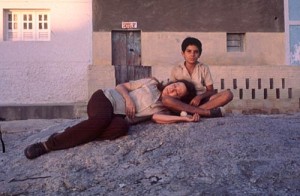by Chris Roberts
theme music here; 01-central-do-brasil1
FOR the first half, it’s all about faces, thousands of them, in a faceless crowd. The poor and needy and almost broken scrape around Rio De Janeiro’s Central Station, scratching a “life” if they’re “lucky”. Many go under, ruthlessly trampled underfoot. Dog eat dog. This is all implied, from the rush, the crush, the tumble.
Dora (played by the world-weary Fernanda Montenegro) is a retired teacher, bitter and jaded, who ekes a living by writing letters dictated and paid for by the illiterate. She doesn’t bother to post these letters. In a way, she’s letting their last hopes and illusions live. In another way, she’s letting them die. Dora has “no children, no husband, no family, no dog”. Eventually she gets a television, albeit briefly. “Well”, she marvels to her one friend, “we made it to the remote control age…”
Things change, or at least shift, when a nine-year-old boy’s mother is killed and Dora – against her better, more cynical judgment – takes pity on him. The orphan, Josue, wants to go to his father, who he’s idealised, across the country. Dora first tries to sell him – yes, sell him – but then is stricken by uncharacteristic guilt and travels on the bus with him, drinking, protesting, bickering. “I don’t like you”, says Josue. “You’re no good”. She can’t find the energy to protest at that. When he adds, “You’re a liar, and so ugly no-one will marry you”, she almost allows a flicker of hurt to scramble across her face.
The second half becomes a travelogue: the odd couple meet equally odd characters. Dora meets a likeable man, but makes her play too soon, even donning lipstick for the first time in a long, long while, and he runs, panicked. Salles again doesn’t allow too much sentimentality here. It happens, it’s done, it sucks, that’s that, what’re you gonna do? Yet naturally, it stays with Dora, another barb in the heart.
There’s a scene where chaos breaks out amid a mass religious pilgrimage. Candles, fireworks, chanting, dizziness. “You’re a curse!” Dora passes out, exhausted. The boy is now the carer. Now they’ve bonded. They stave off pennilessness by writing letters to saints for the desperate, the easily duped. “We’re rich!” exclaims the boy. He buys Dora a five-dollar dress. She feels, momentarily, like Cinderella.
They sort of find what they’re looking for in a new town – “they all look the same: this is the end of the world here” – where Dora muses, “You’ll soon forget me”. And the tone is: no, of course not. But we know that really it’s inevitable, the kid will forget this series of experiences and move on whereas Dora has been tugged out of her grumbling comfort zone to find fresh impetus, fresh pain, and something not a mile away from love.
Central Station is also a film about transience, about moments which aren’t as bad as others, about ageing and youth and memory. And forgetting. About how it’ll all mean nothing soon enough, but maybe it meant something as it took place, just for a shimmer of time.
At the end as Dora leaves on the bus she is brimming with a bitter-sweet feeling of something having happened. She has new perspectives. She is also, still, the human condition, a paradigm of loneliness. But maybe, the film gently urges, bitter-sweet is a better state of being than just plain bitter.
Walter Salles’ 1998 film didn’t set the planet on fire and make Brazilian cinema hot like, say, Fernando Meirelles’ City Of God, but it’s infinitely more subtle and moving. If the later film was garage-punk, this is John Martyn. The soundtrack, by Antonio Pinto and Jaques Morelenbaum, is a delicate, nudging, probing thing throughout, knowing when to gush (rarely) and when to glide (usually). It’s worth taking a break from the hurrying, scurrying crowd to let Central Station speak softly to you of this hard world. (CR)
Further Reading – Walter Salles interview
